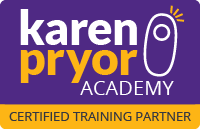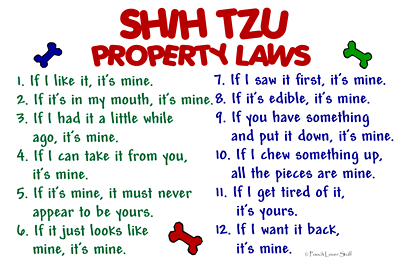Shih Tzu Puppy Training
Shih Tzu Puppy training (or any puppy training) should be both a fun and rewarding experience. Shih Tzu puppy training is alot of fun. They are a very trainable breed of dog and very smart, so smart in-fact that they end up training us….Now That’s a Smart Dog! With patience, love and consistency they can be taught a huge repertoire of behaviors. Shih Tzu puppy training can be very successful being trained for competetive Obedeince, Rally-O, Agility or anything esle they are physically capable of doing. Most Shih Tzu love to be active and to “play” (train) with you. It is mentally stimulating and emotionally satisfying for them and hopefully for you as well. With a good foundation starting in puppyhood, you will have a great future with just a little Shih Tzu puppy training.
I am a Karen Pryor Academy Certified Training Partner (KPA-CTP)-a professional dog trainer. Rather than discuss alot of training psychology or methods for training your Shih Tzu Puppy in this web site, I’m going to refer you to sources that will provide all the assistance you’ll ever need to raise a well-adjusted, well-mannered Shih Tzu.
My dog training website is www.anythings-pawsable.com. There you will find my history and philosophy in dog training. However, many who purchase a Shih Tzu puppy from me live too far away to take advantage of my Puppy Start Right training classes. For these Shih Tzu puppy buyers I recommend finding a Puppy Start Right instructor in your area. I would be happy to help you locate one and get started in classes for your new Shih Tzu puppy training. If there isn’t one, several buyers have purchased the Puppy Start Right book directly from me and an access code which allows them to have 8 weeks of access to the 5 Puppy Start Right ‘videos on demand.’ Much of this training can be done by you at home, and you’ll be amazed how easy it is to be successful. Please feel free to call me with any training questions you have and I’ll be happy to try to help you.
puppy buyers I recommend finding a Puppy Start Right instructor in your area. I would be happy to help you locate one and get started in classes for your new Shih Tzu puppy training. If there isn’t one, several buyers have purchased the Puppy Start Right book directly from me and an access code which allows them to have 8 weeks of access to the 5 Puppy Start Right ‘videos on demand.’ Much of this training can be done by you at home, and you’ll be amazed how easy it is to be successful. Please feel free to call me with any training questions you have and I’ll be happy to try to help you.
The following information is being quoted directly from the #1 puppy training book that I recommend for your Shih Tzu puppy training and is the program I teach at Anything’s PAWSable Dog Training. It is called Puppy Start Right by Kenneth M. Martin, DVM and Debbie Martin, RVT, VTS (Behavior), CPDT-KA, KPA-CTP. You can purchase a copy of this book thru my website www.anythings-pawsable.com or directly from www.clickertraining.com.
‘Unfortunately, many currently available resources provide misinformation regarding dog training and behavior. Much of the information refers to leadership and dominance for structuring our relationship with dogs. This information is not scientifically based and ultimately can be damaging to the human-animal bond.’
‘…Training problems relate to a lack of response to “human taught” cues or commands….such as walking on a leash, coming when called, sitting, lying down, etc. These problems are common in young and adolescent dogs.’
…Prevention of behavior problems through appropriate early training and management helps keep pets in their home… The number one reason for relinquishment is behavior and training problems. Many of these problem behaviors can be prevented with early socialization and foundation training.’ Puppy Start Right, preface
Characteristics of Dogs
When living with dogs it is important to set realistic expectations. Dogs are dogs, and they are going to do dog things. We are not going to stop dogs from having innate behaviors, nor should we expect them never to perform these intrinsic canine behaviors. These characteristics are modified from The Culture Clash by Jean Donaldson.
- Dogs are amoral. They do not know right from wrong. They know safe and unsafe. For example, it is safe to get into the trash when people are absent but unsafe when they are present.
- Dogs are opportunistic and self centered. It is about what’s in it for them.
- Dogs are social. This is why they make good companions.
- Dogs are constantly learning from their actions. Learned behaviors may be appropriate or inappropriate for human counterparts. Let’s evaluate their behavior from a learning perspective.
- Dogs explore the world with their mouths. They lack thumbs. Everything is a potential chew toy.
By remembering these characteristics, it is easier to explain and understand some unwanted dog behaviors. Rather than forcing relationships based on dominance, we suggest a parenting relationship based on trust, guidance, and teaching our dogs appropriate responses.
Successful Canine Parenting
To be a successful canine parent follow these simple rules:
- Live in the land of ‘Do’: Dogs are not conceptual thinkers, but rather absolute. They live in the land of ‘DO’, not ‘DON’T’. We need to put our energy into building a strong foundation and an abundant reinforcement for behavior we want to see, rather than putting our energy into coming up with strategies to stop our dogs from doing something, resulting in frustration for our dogs.
- Understand a dog’s perspective-be fair: Remember dogs are amoral, opportunistic, self-centered, social, constantly learning, and explore the world with their mouths. To be anthropomorphic, dogs make the most of current opportunities because life is short and time is fleeting-Carpe Diem.
- Be a good teacher: Control what your dog learns. Guide him into making the right decisions. Set your dog up to succeed. Don’t waste your time telling your dog what not to do . Instead, teach him the correct behavior.
- Communicate Clearly: Your job is to communicate to your dog when he is performing a correct behavior. Catch him doing appropriate behaviors and reward him for it! A frequent occurrence of positive reinforcement will help your dog learn quickly.
- Be consistent: Inconsistency and unpredictability cause fear and anxiety leading to behavioral problems. Reprimanding jumping one day and rewarding it the next will confuse your dog. Set the rules of the household and make your interactions predictable and consistent.
- Be your dog’s advocate: Your dog cannot speak for himself. Be aware of his body language and protect him from overwhelming situations. A well-meaning group of children running over and surrounding your puppy can be frightening. You need to be willing to intervene and prevent negative experiences.
The principles of canine-rearing are very similar to child-rearing. Strive to be a fair and consistent canine parent. Provide guidance, direction, consistency, predictability, and security rather than punishment. Undesirable behaviors must have consequences, but the consequence should be designed to create learning rather than fear. Physical and verbal reprimands are unnecessary (for your Shih Tzu). Puppy Start Right, pgs14, 15
Puppy Start Right
Shih Tzu puppy training is fun and rewarding when you are confident that you can be successful. The book Puppy Start Right, which can be purchased thru my website link above (www.anythings-pawsable.com), will provide you assistance in the following areas:
- How Dogs Learn
- Puppy Socialization
- Problem Solving and Prevention
- prevention and management
- schedule and routine

- rules of the household
- problem solving model
- play biting and mouthing
- tug of war
- jumping
- counter surfing and stealing objects
- chewing

- digging
- confinement training
- independence training
- food bowl exercises
- handling exercises
- gotcha game
- leash pressure training
- restraint training

- muzzle training
- spay or neuter
- children and dogs
- multiple dog households
- safety and poison control
- Housetraining
- Introduction to Training
- Foundation Training Exercises
I cannot stress strongly enough, Please don’t use physical discipline or harsh tones of voice when Training your Shih Tzu Puppy. As stated above, these not only frighten but are unnecessary and are damaging to your puppy/dog and your relationship with him/her. There are better ways! Even if we believe we are having “success” with these methods, they also cause “fallout”, unpredictable side effects” with our Shih Tzu. Shih Tzu are very sensitive, very trainable, and have a desire to please you. Help them find joy in the things that we want them to do and we create a that on their own will choose what we want. There’s no force, no yelling, no correction, no blame. There’s just joy! So just “catch them in the act of doing something good” and reinforce (reward) it, then watch the magic begin.
![dancing SHIHTZU[1]](http://www.sapphireshihtzu.com/wp-content/uploads/2014/11/th_thSHIHTZU1.gif)